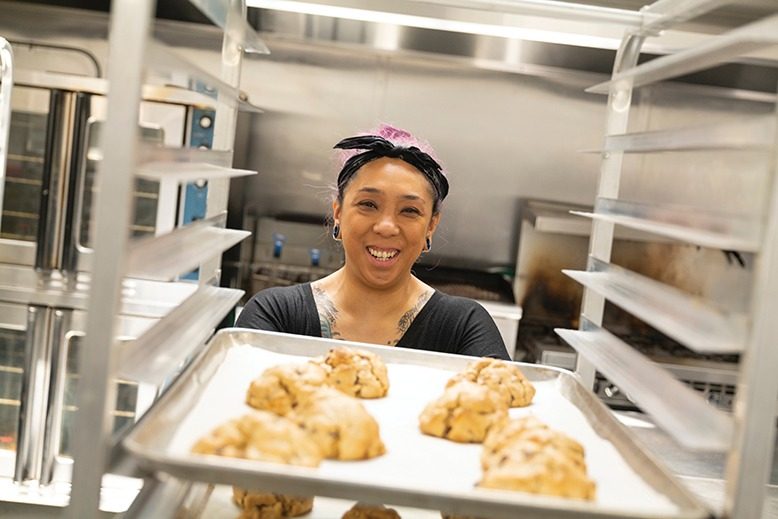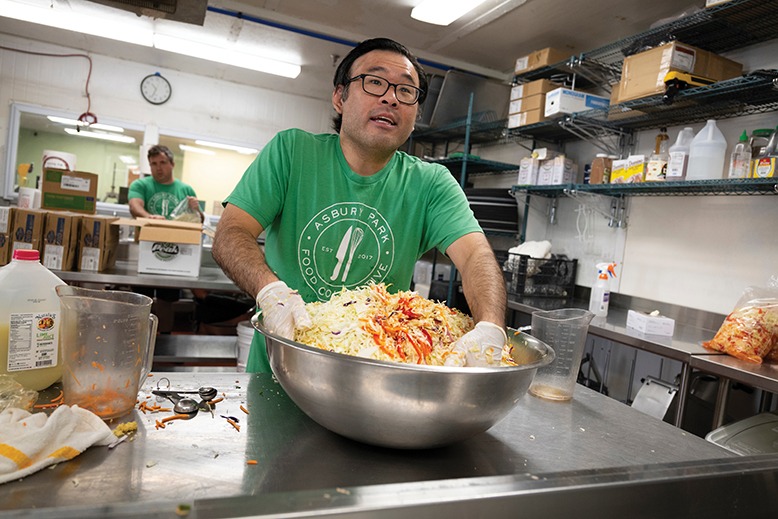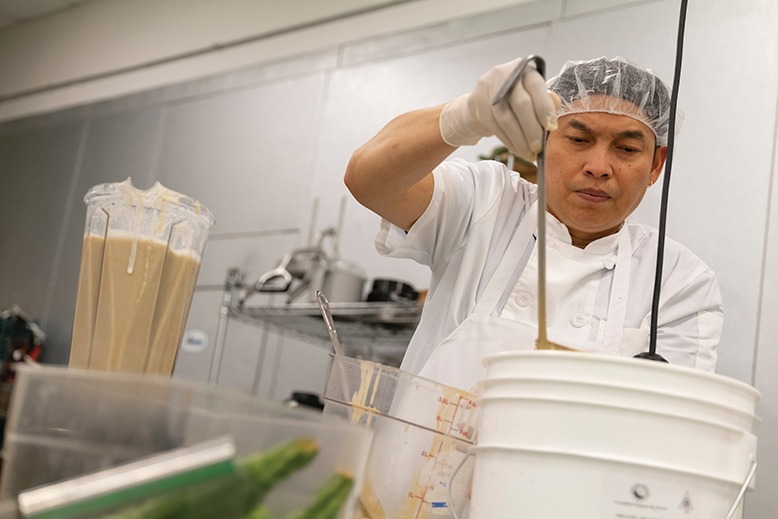
While traveling for his job in digital media, Tom Dunphy fell in love—with regional styles of barbecue. From the far corners of Texas to Memphis to the Carolinas, the Jersey Shore native sampled ribs and brisket from some of the best pitmasters in the country. He began dreaming of opening a Texas-style barbecue spot at home.
When the pandemic hit, Dunphy wasn’t sure it was the right time. But after his wife, Martha, got laid off from her job in sales, the couple decided to go for it, starting with catering. “Being in the corporate world in this day and age is precarious,” he says. “We knew our future was going to be starting something for ourselves.”
The Dunphys started that something, Mutiny BBQ Company, at the Asbury Park Food Collective, one of numerous so-called kitchen incubators that are helping New Jersey entrepreneurs get their businesses off the ground.
The Asbury Park Food Collective provides space for start-up food businesses like Mutiny BBQ to cook, take deliveries and store ingredients (and, in Dunphy’s case, set up a 500-gallon smoker in the gravel parking lot). But it also helps entrepreneurs with the trickier logistical aspects of getting a food business up and running. From permits to banking to vendors, “it can make your head spin, everything it takes to get started,” Dunphy says.

Sam Chung mixes a batch of slaw at the Asbury Park Food Collective, which he co-founded. Photo by John Emerson
Sam Chung, the Collective’s co-founder, remembers that feeling well. In 2012, the former engineer and his business partner, Jay Devino, opened MOGO Korean Fusion Tacos in a 320-square-foot shipping container on the Asbury Park boardwalk. They learned a lot, fast, says Chung, including how tough it was to find affordable, accessible kitchen and storage space.
By 2013, the partners had added a year-round location, but were still searching for another location, when an old seafood warehouse came up for sale. Chung and Devino figured that, by transforming the warehouse into shared commercial kitchen space, they might be able to solve other peoples’ kitchen-space conundrums, give them a reasonably priced launchpad to start a food business, and in the process, create a community.
But there was more. Having been through it all themselves, they could share their knowledge, saving aspiring food entrepreneurs—from cold-brew coffee makers to food-truck operators and caterers—from making some of their mistakes.
The Asbury Park Food Collective isn’t alone in this mission. In the last five years, kitchen incubators around the state have begun providing access to inspected, registered, commercial kitchen spaces. They also offer food start-ups strategic support and contact with a pool of fellow entrepreneurs. Their models vary: At the Collective, business owners pay a monthly membership fee, for example, while at Garden State Kitchen in Orange, they pay by the hour.
All of the incubators share the goal of making things as easy as possible for budding food and beverage businesspeople. From gloves to garbage disposal, “all of those little intricacies are provided,” says Chung. “They just have to come in and do what they’re passionate about.”
New Jersey incubators are part of a larger national movement. According to a report by the Food Corridor, a management software platform, there are more than 600 shared kitchen facilities nationwide. Of those surveyed, the vast majority cited supporting their tenants’ success as part of their primary mission.
At Bellamy Kitchen in Union City, founder and owner Meredith Chartier consults with each new member, guiding them through everything from paperwork to helping streamline their cooking processes. Living in the neighborhood, she’s nearby in case of an emergency (like most of the incubators, Bellamy’s kitchens are open 24 hours, seven days a week).
“It’s not about churning and burning,” the ESL teacher-turned-private-chef says, “I consider these people my friends. I want them to do well.” That often means clients move on to their own kitchen or storefront at some point. According to the Food Corridor survey, 42 percent of start-ups initially housed in kitchen incubators eventually stand on their own.

At Hudson Kitchen, Rodel Tolentino creates a lemon tahini dressing. Photo by John Emerson
Other incubators provide more formal learning opportunities. At the Hudson Kitchen in Kearny, all members, from side hustlers to food-truck operators, receive consulting and mentoring. Before she even opened the 8,000-square-foot space in December 2019, founder and CEO Djenaba Johnson-Jones held a food business bootcamp. Relaunched virtually, the course covers everything from evaluating potential competitors to pricing to branding and marketing. (Johnson-Jones, who had experience at marketing and product development in the publishing business, had also run a fitness business that included a meal-prep service.)

Kris Ohleth, owner of Garden State Kitchen in Orange, connects makers with vendors and suppliers. Photo by John Emerson
“Food is different; you’re not just starting up any business,” says Kris Ohleth, owner and operator of Garden State Kitchen in Orange. Since opening in 2018, Ohleth—who has a background in project management and once managed a farmers market—has offered classes such as Farmers Markets 101 and Instagram for Small Food Businesses. Most are free for the 60 or so companies (she calls them “makers”) that currently use her space.
Ohleth works to connect those makers with her network, from labeling and packaging companies to market managers, vendors, suppliers and others. Similarly, Organic Food Incubator in Bloomfield offers co-manufacturing, product development and consulting, says president Michael Schwartz.
***
The food industry is a notoriously difficult nut to crack. A National Restaurant Association report in February 2020—prior to the pandemic—put sales in the industry at a moderate 4 percent growth rate. Consumer packaged goods (such as premade, ready-to-eat food and beverage products), are a tough go, too; marketing research firm Nielsen found that 85 percent don’t make it past two years on the market.
Even so, food ventures are perennially popular, says Jay Savulich, managing director of Mission Ventures at Rising Tide Capital, a Jersey City-based nonprofit that provides business services to entrepreneurs. “It’s always a good time to go into the food business,” he says. “Everybody has to eat and wants to eat something.”
Savulich estimates two in 10 of the ideas people bring to Rising Tide are food based. (The Hudson Kitchen and Garden State Kitchen developed through the nonprofit’s Community Business Academy program; Rising Tide now refers entrepreneurs to both kitchens.) In the last decade, Savulich has seen an increasing number of career changers and side hustlers get into food businesses, as opposed to former chefs and industry pros.
Kitchen incubators not only provide a launchpad for food newbies, they also support underserved groups. The Food Corridor survey found that women make up 53 percent of incubator tenants and people of color make up 30 percent. In the New York metropolitan area, including parts of New Jersey, people of color account for 57 percent of shared-use kitchen tenants, according to the survey.
These ventures “play a crucial role in creating individual financial success and sustaining the life of local communities,” says Savulich. And if successful, they can quickly go from employing one or two people to creating lots of jobs, from kitchen helpers to delivery drivers.
***
Despite the pandemic—or perhaps because of it—interest in kitchen incubators appears to have grown in the past year.
“On average, we get anywhere between 250 to 300 inquiries a year,” says Nolan Lewin, acting executive director and director of operations at the Food Innovation Center at Rutgers University. In the second half of 2020 alone, Lewin says, FIC, one of the first food-business incubators and accelerators in the state, received more than 800 inquiries.
Though the FIC, founded in 2000, is lauded for its work with food start-ups, from mom-and-pop operations to cutting-edge products like the Impossible Burger, which it helped commercialize, Lewin says he often encourages callers to consider smaller incubators, too.
Some of those recently flocking to kitchen incubators have been looking to make up for lost income. Paula Lopez, a tattoo artist, turned to baking to relieve stress when the shop she worked at in Bloomfield was forced to close because of pandemic restrictions in early 2020. After friends raved about her chocolate chip cookies—half-pound creations studded with macadamia nuts or stuffed with cannoli cream—she decided she could sell them.
Lopez couldn’t afford to open a cookie shop, nor could she run Secret Squirrel Cookies from her West Orange home. (In New Jersey, she quickly learned, it’s illegal to make and sell food, even baked goods, in a home kitchen. However, changes in the Department of Health’s rules are pending implementation, following a lawsuit launched by a group of home bakers.)
The solution for now? Lopez collects orders on her website, then heads to Garden State Kitchen on Saturday nights, sometimes baking until 2 am. Though the tattoo parlor is open again, Lopez doesn’t plan to stop baking; she loves the creativity—and the safety net.
[RELATED: Meet Caterer Extraordinaire Chef Covas]
Motivation varies among food entrepreneurs. Michal Prevor, a Jersey City resident whose business travel was derailed by the pandemic (she sells irrigation equipment), got into baking to help her housekeeper, Carmen, who had lost most of her clients. In her own kitchen, Prevor perfected Eastern European-inspired babka with the idea of selling the cake-like breads to support Carmen. Now, Prevor makes hundreds of the twisty loaves each week under the name Babka Bailout, filling Bellamy Kitchen with the smell of sweet dough, sugar syrup, cinnamon and dulce de leche. Prevor, who now employs her housekeeper full-time in the babka business, doesn’t plan on stopping. “I finally found my calling,” she says.
For Aaron Hannon of Union Township, turning a hot-sauce hobby into a business provided a distraction from the chaos of 2020. Together with longtime friends Michael Drew and Justin Rosa, Hannon, a freelance digital marketer and stay-at-home parent, founded Family Band Hot Sauce. Being stuck at home, he says, “gave us more time to plan and strategize,” including setting up shop at Garden State Kitchen. Working out of the 100-year-old former ironworks building boosted the trio’s confidence and knife skills. Plus, he says, “seeing other people in the kitchen is inspiring.”
That’s exactly why Ohleth, Garden State Kitchen’s founder, says, “We didn’t put walls up” when constructing the 3,200-square-foot building’s five kitchen spaces. Overhearing makers brainstorming with one another, swapping recipes and tips, especially during the pandemic, has brought her to tears.

Djenaba Johnson-Jones holds food-business bootcamps at her Hudson Kitchen in Kearny. Photo by John Emerson
Johnson-Jones, too, imagined community would be the heart of the Hudson Kitchen. In addition to kitchen space, she made sure the Kearny kitchen also had a coworking space where members could mingle and collaborate. During the pandemic, she says, members banded together to feed front-line workers and collaborated on dishes and products.
***
Things may not work out for every pandemic pivoter or new food business, notes Chung of the Asbury Park Food Collective. Still, the incubators can lower the barrier to entry. Tom Dunphy’s upfront payment for six months at the Collective was $1,620, funded in part by stimulus checks. At Garden State Kitchen, it costs $500 to get onboard; half of that is refundable.
Often, fortune favors the bold. Or, as Savulich of Rising Tide Capital puts it, “today’s risk-takers are tomorrow’s operators.” As people get vaccinated and businesses reopen, he sees a “dawning of a new era of food businesses.”
Chung agrees: “If anything, the pandemic was a catalyst for innovation and change,” he says, adding, “more people are starting to realize they want to do something they’re passionate about. Maybe they had time off to reflect, or have been working from home. Whatever the case, there appear to be people that don’t want to go back to the rat race.”
Tom Dunphy isn’t there yet—he’s still balancing days working from home for his day job with late nights at the Collective tending to his smoker. The dream, he says, is to one day open a restaurant version of Mutiny BBQ. He’s now one step closer.
“It is a horrible thing that happened,” he concedes. But, if not for the pandemic giving him the push to start and the food-collective experience, “maybe I would’ve given up.”
Sophia F. Gottfried is a North Jersey native who loves discovering under-the-radar restaurants and food businesses—and telling the stories of the entrepreneurs behind them.
